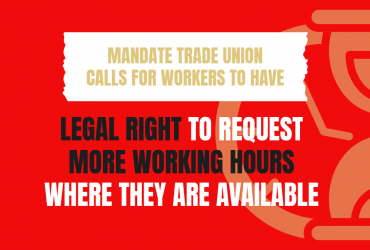Mandate’s Gerry Light moves motion on decent work
Wednesday 3 July 2013Mandate Assistant General Secretary Gerry Light proposed the motion on decent work at the ICTU BDC today. The motion has been adopted and below is Mr Light’s address to conference.
President, Delegates
It gives me particular satisfaction on behalf of Mandate Trade Union to move and seek your support for motion 22. As you can clearly see its subject matter reflects the main theme of this Biennial Delegate Conference which is the promotion of the basic human right of having a reasonable chance of getting and sustaining decent work in order to properly participate in the society in which one lives.
Through addressing the many complex issues that face us in these challenging times it is easy to lose sight on some of the basic fundamentals and aspirations which have underpinned and driven the evolution of the trade union movement. One of the simplest which has served us well over time is the demand for a fair days pay for a fair days work.
Unfortunately, it is not an over statement to say that certain realities of the modern workplace would find parallels with the Dublin labour market of 1913. The opportunity to exploit workers was widely availed of by unscrupulous employers largely because of excessive unemployment and associated social deprivation. Hiring fares were the norm with no guarantee of employment from one day to the next. When work was secured there was no assurance that earnings would be maintained. Employer manipulation of working hours was used as an effective control mechanism leading to unhealthy levels of compliance and subservience. Workers routinely faced bosses who were determined by whatever means to reduce terms and conditions to the lowest possible level; it wasn’t today or yesterday that the desire for a race to the bottom became popular. Most of these challenges are not only familiar in a historical context but regrettably they are as real today as they were then, for many current Irish workers, particularly those employed in the services sector.
This type of casualization of the workplace and the consequential epidemic of precarious working that it breeds is one of the biggest if not the biggest threat facing our movement into the foreseeable future. No longer is this threat confined to the retail or indeed private sector for in recent times we have witnessed its creeping corrosive influence enter into areas of the public sector as well. We must respond in a structured and resourced way which is commensurate to the challenge. If we do not then we run the danger of allowing the persistent nature and consequential normalisation of this new working environment damage our credibility and more importantly our ability to meaningfully influence into the future, indeed delegates, as I have already suggested it may challenge our very existence.
In the context of the retail sector we have discovered that some of the most profitable employers are operating a structure whereby up to 90% of their workers are employed on part time flexible contracts. Weekly hours can be as low as 5. To retain a contract a worker must in some cases make themselves available over an equivalent number of days from 7am to 11pm which invariably include Saturdays, Sundays and Public Holidays, in fact the spread in some cases is now over 365 days a year. Now that we are thrust back into a model of free collective bargaining we in Mandate insist that every agreement entered in to must contain provisions whereby decent weekly earning thresholds are not only created but sustained and protected. Furthermore, we insist these hours are worked over patterns that have a true regard for individual workers work life balance needs.
Sadly, this precarious working environment is not challenged in any meaningful way by an Irish government whose current job creation policy appears to be singularly focused on shifting numbers from the unemployed to the employed through the provision of jobs and labour market initiatives that have little or no regard for the notion of quality or long term security, rather the emphasis is solely on the numbers game. Our political leaders also fail to grasp that the unprecedented growth in precarious work coupled with their stark austerity policies which have been prevalent since the start of the current recession fundamentally undermines any chance for real economic recovery. It’s simple and they don’t appear to get it. The many thousands of workers and their families so affected are crudely denied the opportunity to participate in and contribute to any meaningful domestic economy recovery. Ironically it took the IMF in their latest review of the economy to point out that if the vast amount of part time workers who are involuntary compelled to work reduced hours are factored in, it would push the current unemployment figures to effectively nearly double the headline rate.
At Mandate we are fighting back. Earlier this year we commissioned this report called “Decent Work? The Impact of the Recession on Low Paid Workers”. This was a deliberate effort to highlight the issue of precarious working and place it on a stage where it commands the attention of those of us who should care. However, our report does more in that it proposes credible policy solutions that in our view must be central to any uniformed approach by the union movement.
Therefore, delegates as our motion suggests, we need to move the fight against precarious working practices on, and to a bigger platform. A coordinated movement wide approach must be implemented immediately and resourced with sufficient capacity to ensure that we bring to an end these deplorable practices which were as unacceptable in 1913 as they are today. If ever the well worn slogan of “an injury to one is an injury to all” meant anything we must ensure that in this particular circumstance our combined actions speaks louder than the words.
Delegates I formally move motion 22 and ask for your support.





